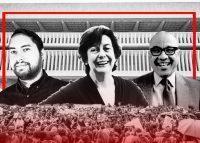 What you need to know about landlords’ challenge to New York’s rent law
What you need to know about landlords’ challenge to New York’s rent law
Trending
Landlord group’s new legislative agenda looks for ways to up rents in regulated units
The group wants to replace the IAI program, which was reformed under the new rent law in June
A small landlord group has unveiled its top housing priorities for next year, which include a proposal to create a new program that allows landlords to increase rents on stabilized apartments.
The Community Housing Improvement Program on Tuesday unveiled its legislative agenda for next year, which includes a proposal to replace the Individual Apartment Improvement program with the “Housing Preservation Act.” The HPA would allow a landlord to temporarily hike legal rents by 1/90th of the cost of renovating the apartment, with individual caps depending on apartment size.
Read more
 What you need to know about landlords’ challenge to New York’s rent law
What you need to know about landlords’ challenge to New York’s rent law
 The money behind the New York tenant movement
The money behind the New York tenant movement
Under the proposal, maximum legal rent increases would be set at $500 for a studio, $666.67 for a one-bedroom, $777.78 for a two-bedroom and $888.88 for an apartment with more than two bedrooms. The increases would expire after 10 years, at which time the rent would become the median market-rate for the area. In cases where legal rent exceeds one-third of the household’s income, the rent would be frozen at one-third of the household’s income and the state would extend a property tax to the owner to make up for the lower rent rate, CHIP proposes.
The Housing Stability and Tenant Protection Act of 2019, which was passed in June, revised the IAI program, which allowed owners to permanently increase rents by 1/40th or 1/60th the cost of apartment improvements. The new law capped increases at $15,000 over the course of 15 years, which comes to roughly a monthly increase of $83. It also made such hikes temporary, mandating that they expire after 30 years.
CHIP President Jay Martin acknowledged that there might not be much appetite in the state legislature to undo changes that were just made to the IAI program.
“We’re not naive to the political reality,” Martin said. “You put out your proposals and hope to have a conversation.”
In October, a statewide coalition of tenant groups, dubbed Housing Justice for All, released its own demands for next year’s legislative session. The coalition proposed eliminating another program under rent-stabilization, Major Capital Improvements. It also called for the passage of “good cause” eviction and the elimination of the tax break formerly known as 421a.
CHIP also proposed a five-year freeze on property taxes for certain owners of rent-stabilized buildings, a cap on utilities costs in stabilized properties and a tax credit program for reducing the carbon footprint of buildings.
The group’s agenda also pushes for a tax abatement for lead removal. The Real Estate Board of New York has also called on the city to help cover the costs of lead abatement in stabilized properties.




